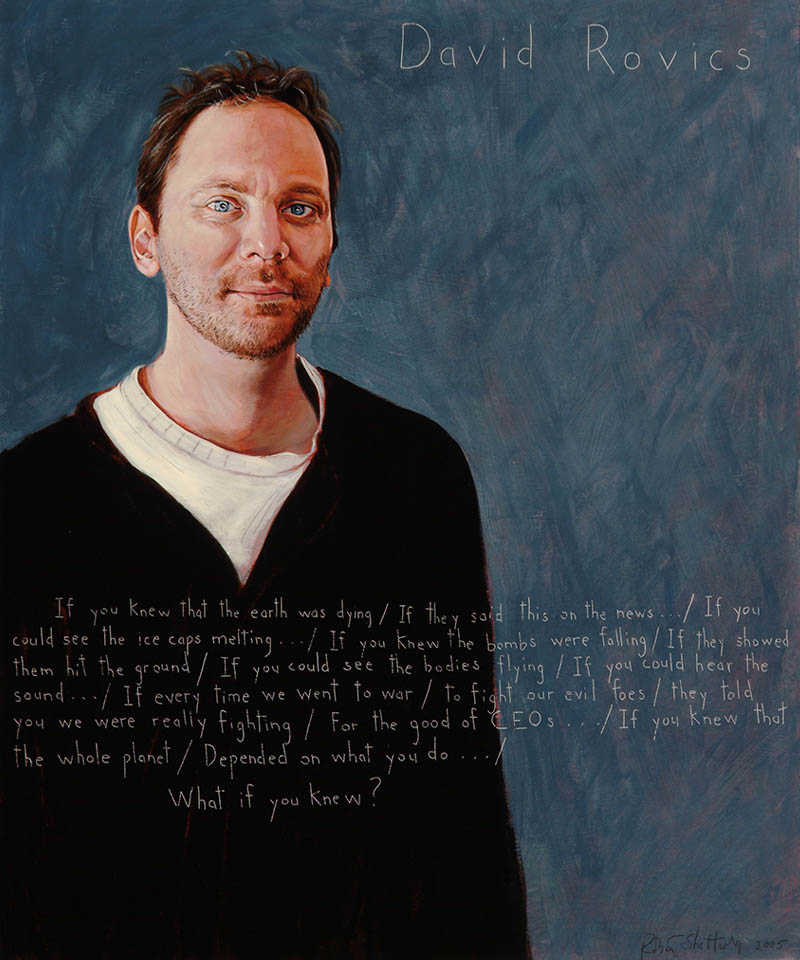
David Rovics
Singer/songwriter : b. 1967
“If you knew that the earth was dying/ If they said this on the news…/ If you could see the ice caps melting…/ If you knew the bombs were falling/ If they showed them hit the ground/ If you could see the bodies flying/ If you could hear the sound…/ If every time we went to war/ To fight our evil foes/ they told you we were really fighting/ For the good of CEOs…/ If you knew that the whole planet / Depended on what you do…/ What if you knew?”
Biography
David Rovics was born in New York City but grew up in Connecticut. After a brief stint at Earlham College in Indiana, he moved to Berkeley, California, where he held a series of blue-collar jobs (he’s a member of the Industrial Workers of the World). By the early 1990s, he’d moved to Boston, where he hit the subways with an acoustic guitar and songs of protest.
He generally refers to himself as simply a “songwriter” or “musician,” but perhaps can be more fully described as an American acoustic protest singer.
Unlike most recording artists, Rovics makes all of his music available online for free and encourages fans to videotape his concerts. When he performs live, he doesn’t use a set list, but lets the concert unfold on its own.
Rovics released his first, all-original album in 1998, and followed it with several more, including the all-mp3-released “Who Would Jesus Bomb?” He cut 21 albums between 1996 and 2011, including two for children.
Rovics’ lyrics offer listeners plenty to think about. He encourages the have-nots of the world to stick together in “Union Makes Us Strong”: During the Depression people fought and won back then/Now the battle’s global and it was must be won again. In”Berkshire Hills,” he takes a step back in time to Shay’s Rebellion: We said to hell with King John Adams/Of this farce we’d had our fill/And we set our sights on liberty/Here in the Berkshire hills. As a secular Jew, Rovics takes Israel to task in “Lebanon 2006”: A hundred thousand homes/Levelled to the ground/Every olive branch on offer/Burned where it was found/Every chance at dialogue/Rejected right on cue/If you’re gonna burn your bridges/You might as well bomb them too.
Rovics believes music can connect people in ways nothing else can: “We’re using music at marches and rallies to inspire the troops. And…to educate people about things that are happening, and to talk about it in a way that hopefully might be more memorable than a speech… There’s something about music that makes people feel optimistic,” he says.
To anyone who’d like to do what he does, he says, “Keep writing. Keep learning. Be open to criticism from yourself or others on music or politics. Never delude yourself into thinking you’re original. Keep listening to music and learning songs other people wrote. Keep your heart open. See the world. Put yourself in other peoples’ shoes regularly…”
Rovics lives in Portland, Oregon with his wife and daughter. His writes for CounterPunch and Truthout.
Programs
Americans Who Tell the Truth (AWTT) offers a variety of ways to engage with its portraits and portrait subjects. Host an exhibit, use our free lesson plans and educational programs, or engage with a member of the AWTT team or portrait subjects.

Education
AWTT has educational materials and lesson plans that ask students to grapple with truth, justice, and freedom.

Exhibits & Community Engagement
AWTT encourages community engagement programs and exhibits accompanied by public events that stimulate dialogue around citizenship, education, and activism.